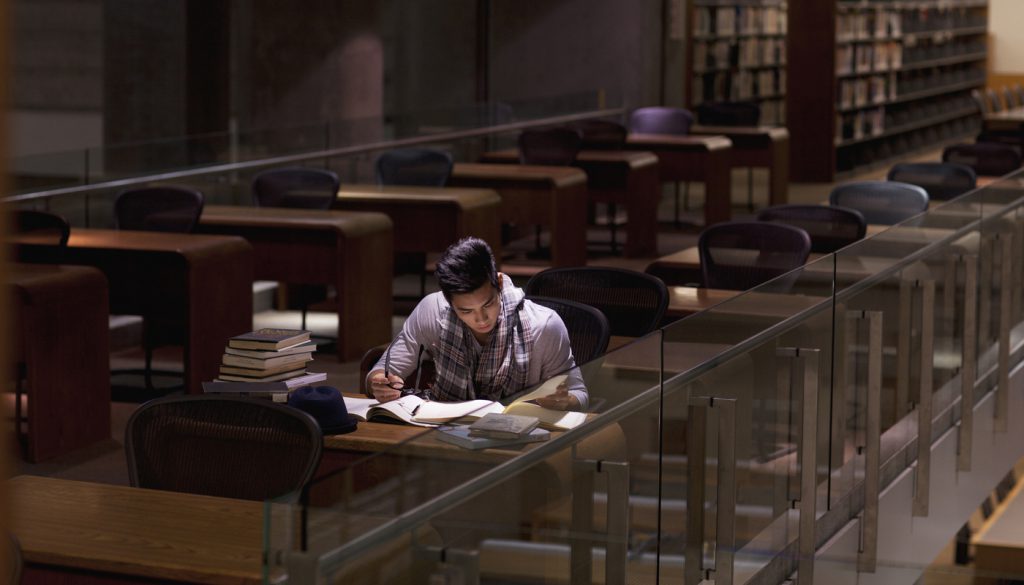Optimize Learning With Psychological Science

It’s September, which means fall has arrived for those in the Northern Hemisphere: The leaves are changing colors, the days are getting cooler, and students everywhere are getting ready for their first midterm exams. Visit any university campus and you’re likely to see students trudging off to the library with highlighters and textbooks in hand, ready for another caffeine-fueled all-night study session.
Fortunately, a wealth of cognitive psychology research sheds light on what students should be doing to ace that first test – in an article published in Perspectives on Psychological Science, a team of scientists distills these findings into a set of useful tips specifically for students.
“Our goal with the paper was to write what was basically a how-to guide about how students could do well in school, with the suggestions coming from research in psychology,” said Adam Putnam, lead author of the paper and a Visiting Assistant Professor of Psychology at Carleton College. “While there are many other good academic reviews of effective study strategies, we wanted to have a bite-size summary that focused on things students and teachers could put into practice right away.”
The article offers evidence-based suggestions that students have heard many times before: go to class, do the reading, find a quiet place to study (without distractions), and stay organized. These suggestions may seem like common sense, and science shows that these kinds of practices really do matter.
Other evidence-based recommendations, however, may seem less intuitive. For example, many strategies that students know and love—highlighting while reading or staying up late to cram the night before a test—are only effective in the short term: They may help for the test tomorrow, but probably won’t lead to learning that holds up until the end of the semester.
Instead, the strategies that do work—like taking a practice test—require more effort up front. The payoff with these labor-intensive practices is that they tend to produce deeper learning that lasts for a long time. Some of these suggestions include:
- Study for a little bit every day. One of the most robust findings in all of cognitive psychology research is the spacing effect, which shows that learning material over several study sessions that are spaced out over time is more effective than cramming everything into one session.
- Read, Recite and Review. Take 5 minutes to write a summary of a chapter’s big ideas after finishing the reading (aka practicing retrieval), rather than summarizing as you go. Then, check what you got right and what you missed before moving on.
- Take notes by hand rather than on a laptop. You’ll be less prone to distract yourself (or your classmates) with various apps and website and the act of writing by hand may even help you to remember more.
- Test yourself on key ideas. Using flash cards, practice quizzes, and friends to test yourself will help you practice retrieving information from memory and is one of the best ways to learn something for the long term.
The authors also make suggestions about managing time and tasks effectively and keeping up a healthy work-life balance. They even review some findings that suggest that exercising and sleeping enough can enhance creativity and ensure that memories are stored in long-term memory.
“Some students can really benefit from taking time to think about how they are approaching studying,” said Putnam. “I’ve had students who fail the first exam in a class, but we can have a 15-minute conversation about study strategies and the student will pass the next test with flying colors.”
Although the article was written with first- or second-year university students in mind, the study strategies will likely help students of all ages. “After our paper came out, we’ve been getting emails from around the world about how students and teachers are putting the suggestions into practice,” Putnam said. “It is definitely a cool example of how psychological science can impact people’s day-to-day lives.”
The report, co-authored by Victor W. Sungkhasettee and Henry L. Roediger III of Washington University in St. Louis, is available for free online, and readers are encouraged to share it with the teachers and students they know.
Reference
Putnam, A.L., Sungkhasettee, V.W., & Roediger, H.L. (2017). Optimizing learning in college: Tips from cognitive psychology. Perspectives on Psychological Science, 11, 652-660. doi:10.1177/1745691616645770





Comments
Hello, how could I download for free the paper?
Sorry for my english.
APS regularly opens certain online articles for discussion on our website. Effective February 2021, you must be a logged-in APS member to post comments. By posting a comment, you agree to our Community Guidelines and the display of your profile information, including your name and affiliation. Any opinions, findings, conclusions, or recommendations present in article comments are those of the writers and do not necessarily reflect the views of APS or the article’s author. For more information, please see our Community Guidelines.
Please login with your APS account to comment.